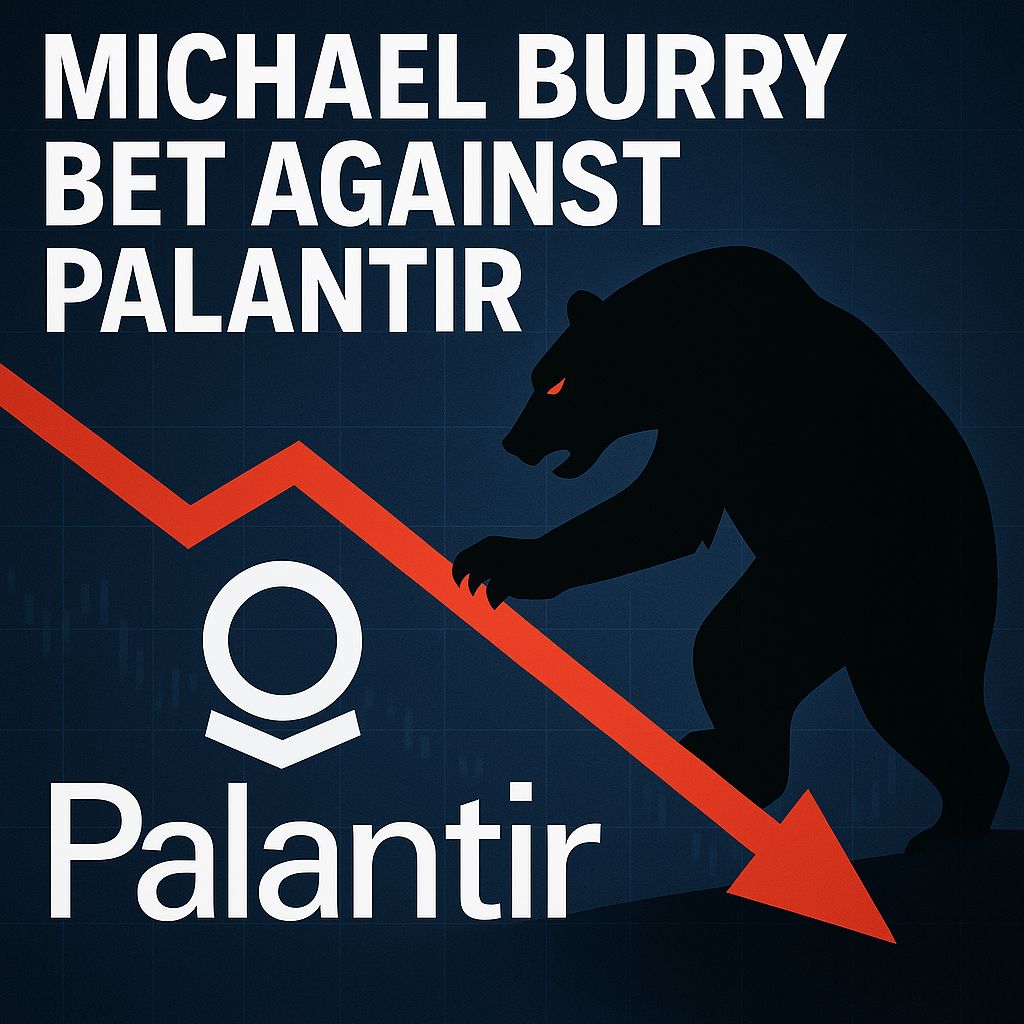
Daily Finance Newsletter- Palantir Saga
Last week, something fascinating happened in the stock market—the kind of drama that makes Hollywood writers jealous. It's a story about billionaire bets, computer warfare, and why the scariest moments in investing are often your greatest opportunities.
Let me tell you what happened to Palantir—and more importantly, why it matters to you.
The Setup: When Good News Turned Bad
Picture this: You're holding shares of a company that's absolutely crushing it. Palantir Technologies, the AI and data analytics giant, had climbed to an impressive $203-204 per share. Then came earnings day—the moment every investor waits for.
The company announced record earnings. In any normal universe, this is champagne-popping news. When companies exceed expectations, their stock typically soars.
Instead? Palantir plummeted to $169 in a matter of days.
Imagine training for months, winning your race, and somehow ending up with a penalty. That's what happened here. Investors who owned the stock were understandably freaking out, flooding financial advisors with panicked messages: "Should I sell? What's happening?!"
Enter the Big Short Guy
To understand this mystery, we need to meet our villain—or anti-hero, depending on your perspective.
Michael Burry is a legendary investor famous for predicting the 2008 housing crisis (yes, that guy from "The Big Short"). He made billions betting against the mortgage market when everyone thought he was crazy. He's Wall Street's most famous pessimist—and when he speaks, markets listen.
Here's where it gets interesting.
Before we go deeper, Special thanks to our sponsor of this edition
Don’t get SaaD. Get Rippling.
Remember when software made business simpler?
Today, the average company runs 100+ apps—each with its own logins, data, and headaches. HR can’t find employee info. IT fights security blind spots. Finance reconciles numbers instead of planning growth.
Our State of Software Sprawl report reveals the true cost of “Software as a Disservice” (SaaD)—and how much time, money, and sanity it’s draining from your teams.
The future of work is unified. Don’t get SaaD. Get Rippling.
The Billion-Dollar Chess Move
Before Palantir's earnings were announced, Burry quietly assembled a massive position betting against the company—a "short position" worth potentially billions of dollars. Think of it like buying insurance that pays out if Palantir's stock crashes.
But here's the twist that changes everything.
As a major fund manager, Burry is required to file something called a 13F form—basically a public declaration to the government that says, "Hey, I just made a huge bet that could move markets."
Think of it like going to a grocery store intending to buy ALL the milk. You'd need to tell them ahead of time so they can restock and not cause chaos for other shoppers, right?
Normally, these forms are filed mid-November. Routine. Boring. Expected.
Burry filed his on the exact same day Palantir was reporting record earnings.
Not a coincidence. Not even close.
The Media Firestorm
The moment that 13F hit the wires, headlines exploded everywhere:
"Michael Burry Bets Billions That Palantir Is the World's Biggest Bubble!"
Suddenly, financial media had their story. The man who predicted 2008 was now predicting Palantir's demise. Young investors, seasoned traders, everyone saw the same alarming news.
And just like that—fear took over.
One investor recounted getting frantic texts from friends in their twenties: "Have you seen what Michael Burry says? We have to sell! He thinks it's going down!"
This is where the plot thickens and gets a bit sci-fi.
When Computers Declare War
Here's something most people don't realize: modern stock markets aren't just humans clicking "buy" and "sell" buttons. Behind the scenes, there's an entire ecosystem of sophisticated computer algorithms—think of them as hyperintelligent robots—trading at lightning speed.
These algorithms do in 20 seconds what would take human traders hours to accomplish. They're designed to move hundreds of millions of dollars with ruthless efficiency.
When one major algorithm sees a "SELL" signal, it doesn't pause to read earnings reports or analyze fundamentals. It sees danger and reacts. And then it tells other algorithms, who tell other algorithms, creating a cascade.
Imagine a crowded theater where someone yells "FIRE!"—even if there's no fire, the panic is real and everyone stampedes for the exit. That's essentially what happened.
The computers saw Burry's massive short position making headlines. They interpreted this as: "Big money thinks this stock is doomed." So they started selling. Fast. Furiously. Without mercy.
Other algorithms saw those algorithms selling and thought: "They must know something we don't!" So they sold even faster.
Nobody wanted to be left holding the hot potato.
The Irony That Cost Billions
Here's the truly wild part: While computers were in full panic mode, dumping Palantir shares, the company was literally announcing record profits and groundbreaking partnerships.
The actual fundamentals—the business performance that should determine stock price—couldn't have been better. But the algorithms don't care about earnings. They care about momentum, patterns, and not being the last one out the door.
It's like showing up to a party with an amazing gift, but someone spreads a rumor you're boring, so everyone leaves before you can even say hello. The gift (Palantir's performance) was great. The perception (manufactured by timing) was terrible.
The Billion-Dollar Question: Why That Day?
This is where things get controversial.
Market experts believe Burry's timing wasn't accidental—it was surgical. By filing his 13F on earnings day, he knew the media would create a narrative collision:
Positive story: Palantir crushes earnings
Negative story: Legendary investor bets billions against Palantir
Which story is more dramatic? Which gets more clicks? Which creates more fear?
The negative one wins every time.
When fear meets algorithmic trading, you get a stock crash—even when the underlying company is thriving. And when you've bet billions that the stock will fall, that crash makes you incredibly rich.
Estimates suggest Burry could have made hundreds of millions to over a billion dollars from this single move. For all we know, he may have already closed his position and walked away with a fortune while everyday investors were still panicking.
The Silver Lining: Your Advantage
Now, here's where this story gets empowering instead of depressing.
Remember that saying, "The night is always darkest before the sun rises"?
These moments of chaos are actually golden opportunities for smart individual investors.
Why? Because you have something big Wall Street firms don't have: patience and control over your own emotions.
Professional money managers managing billions must keep their money moving constantly. They can't just sit on their hands. Their computers are programmed to react, not reflect.
But you? You can think. You can wait. You can see through the storm.
When a fundamentally strong company gets caught in market manipulation and algorithmic warfare, it goes on sale. Serious, deep discount sale.
What the Smart Money Is Doing
So what happened after the dust settled?
Keith Fitz-Gerald—the analyst who originally recommended Palantir when it was at $7 per share (yes, you read that right, $7)—had a simple message:
"I'm buying more."
He bought more when it dropped to $169. He'll buy more as it climbs back to $200. His prediction? Palantir could be 3-5 times higher in just a few years. Potentially $600+ per share.
Why? Because nothing about the company fundamentally changed. The earnings were still record-breaking. The partnerships were still groundbreaking. The technology is still at the forefront of AI and data analytics—arguably the most transformational sector of our lifetime.
The only thing that changed was the perception, temporarily manipulated by well-timed fear.
The Dollar-Cost Averaging Wisdom
This brings us to one of the most powerful strategies in investing: dollar-cost averaging (or as some call it, "keeping powder dry").
Instead of putting all your money into a stock at once, you invest gradually over time. This strategy means when moments like last week happen—when quality stocks get unfairly hammered—you have ammunition to buy more at discounted prices.
You're not trying to time the perfect bottom. You're systematically buying quality companies, and when they go on sale due to market drama rather than business problems, you load up.
It's the investing equivalent of being the calm person in the panicked theater who realizes there's no actual fire.
The Bigger Picture: Technology's Unstoppable March
Regardless of individual stock opinions, here's an undeniable truth: we're living through a technological revolution.
AI, robotics, neural networks, autonomous systems—these aren't science fiction anymore. They're reshaping every industry from healthcare to transportation to defense.
Companies at the forefront of this revolution—whether it's Palantir's AI platforms, NVIDIA's chips powering AI, or NQ's quantum computing advances—are building the infrastructure of our future.
Yes, there will be volatility. Yes, there will be dramatic swings. Yes, there will be Michael Burrys making contrarian bets.
But the underlying trend—the transformation of our world through technology—isn't stopping. And as one market expert put it: "This is an investable opportunity we will never again see in our lifetimes."
Three Lessons to Take Away
1. Headlines Don't Equal Reality When you see dramatic market news, take a breath. Ask: "Did the company fundamentally change, or just the perception?" Most of the time, it's perception—and perception is temporary.
2. Fear Is Expensive Selling quality stocks in panic often means paying taxes on gains, missing the recovery, and buying back in at higher prices later. Fear has a price tag.
3. Chaos Creates Opportunity The best investment opportunities often come dressed as disasters. When algorithms panic and headlines scream, that's when patient investors shop for bargains.
The Verdict on Palantir
As of now, Palantir has already bounced back from $169 to around $180, trading in after-hours markets. Analysts expect it to reclaim $200 potentially before year-end.
The company didn't change. The algorithms calmed down. The fear subsided. The stock recovered.
Meanwhile, those who sold in panic locked in losses. Those who bought during the chaos? They're already sitting on gains.
Final Thoughts
What happened to Palantir last week was a masterclass in how modern markets work—and don't work. It showed us that:
Markets can be temporarily manipulated by well-timed information
Algorithms can create volatility disconnected from fundamentals
Media narratives often overpower actual business performance
Individual investors can actually have an advantage over institutions—if they keep their heads
The next time you see a stock you own plummeting despite good news, remember this story. Take a breath. Look at the fundamentals. Ask whether anything actually changed about the business.
And maybe, just maybe, instead of selling in fear, you'll be the one buying the dip while everyone else is running for the exits.
Because as they say on Wall Street: "Be fearful when others are greedy, and greedy when others are fearful."
Last week, Palantir gave us a perfect example of what that looks like in action.
Stay curious. Stay calm. Stay invested.
P.S. — This isn't investment advice for your specific situation, but rather education about how markets really work. Always do your own research and consider consulting with a financial advisor for personalized guidance.
What did you think of this breakdown? Have you experienced similar panic moments with stocks you own? I'd love to hear your thoughts—reply and let me know!


